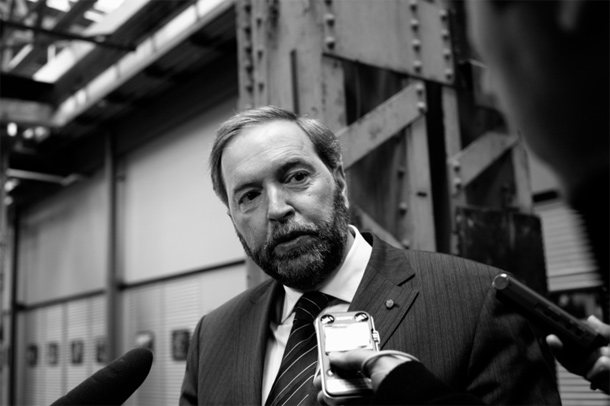"For the first time in my life, I'm trying to find ice."
Alex McIntyre was standing on the bridge of the Akademik Ioffe as the Russian-flagged ice-strengthened cruise ship transited the Northwest Passage this summer. A Canadian ice-pilot with four decades of Arctic experience, McIntyre remembers when our route was choked with sea-ice that was 10 or 15 metres thick.
I was a guest lecturer on the ship and our futile search for ice has haunted me ever since. For the disappearing ice foretells a drastic change in the planet's climate system and with it the destruction of ecosystems and communities everywhere.
I was struck with a tidal wave of despair -- that only grew when, via satellite phone, I learned of Jack Layton's untimely death.
In Aug. 2007, I had travelled with Jack to Auyuittuq National Park on Baffin Island, where local Inuit pointed out newly green tundra and rapidly retreating glaciers and told us about the receding and rotting sea-ice.
Jack was not surprised by what he was seeing and hearing. He knew that climate change has triggered pernicious "feedback loops."
In just four decades, the average annual air temperature in the Arctic has risen by 3 degrees Celsius. Among other things, this melts sea-ice that had previously reflected most of the sun's radiant energy back into space. That giant mirror has been replaced by dark open water, which acts like a sponge and absorbs the energy instead. The newly warmed water then flows under the remaining ice, melting it from below, which exposes more water, which absorbs more energy, and so on.
Jack also knew that the geological record shows the Arctic has been free of ice before -- and that this provides no comfort. Those changes took place over thousands of years; those occurring now are happening within a human lifetime, leaving no time for ecosystems to adapt or evolve.
A lesser man might have ignored these inconvenient truths and focused on the here-and-now, which for a politician is oftentimes just the next poll. Yet Jack believed that human beings have the empathy and intelligence to cooperate, especially in the face of existential threats.
Words from Layton's deathbed
Jack did what he could to address the climate change crisis. He gave Stephen Harper a copy of Tim Flannery's The Weathermakers and implored him to read it. He introduced a private member's bill that -- if Conservative-appointed senators hadn't defeated it -- would have committed the federal government to reducing CO2 emissions to 25 per cent below 1990 levels by 2020 and 80 per cent by 2050. And earlier this year, he ran on an election platform of eliminating the $1.4 billion per year of federal subsidies for the tar sands.
Jack's engagement with climate change was personal. I remember how proud he was of his role in installing a windmill at Toronto's Exhibition Place. I remember him telling me about his feeling of deep discomfort after the BC NDP came out swinging with its "axe-the-tax" slogan against then-premier Gordon Campbell's bold (if flawed) carbon tax.
Nowhere was Jack's personal commitment more evident than in the words he directed to young Canadians from his deathbed:
"There are great challenges before you, from the overwhelming nature of climate change to the unfairness of an economy that excludes so many from our collective wealth, and the changes necessary to build a more inclusive and generous Canada."
It was telling that Tim Flannery, now Australia's chief climate commissioner, was one of the pallbearers at Jack's funeral.
Now, after his death, New Democrats are looking for a new federal leader. We talk about fluency in English and French as a necessary qualification, and indeed it should be. But just as important is a genuine recognition of the enormity of the climate change crisis, and a demonstrated commitment to addressing it quickly and firmly.
It is with respect to that second criterion, above all, where Thomas Mulcair shines.
Experience as environment minister
In 2005, Mulcair was minister of the environment in Jean Charest's government in Quebec. After a construction company cavalierly filled in a marsh and began building a housing project, Mulcair took the unprecedented step of ordering it to restore the wetland. His action provoked the ire of both the developer and the mayor of Laval who were, respectively, major financial and political supporters of the provincial Liberal Party.
As Mulcair explained to the news magazine L'actualité this past May, "It was then that things started going badly with my relationship with Jean Charest. There was a great deal of land at play in Laval, especially, and Charest said to me that he couldn't do that to Mayor Gilles Vaillancourt." [My translation]
The tensions between Charest and Mulcair were also linked to the latter's opposition to a planned hotel and condominium development within Mount Orford Provincial Park, in the Eastern Townships, as well as his insistence that Quebec should reduce its CO2 emissions to six per cent below 1990 levels by 2012 (consistent with Canada's obligations under the Kyoto Protocol) and 10 per cent by 2015.
Mulcair ultimately refused to sign the order-in-council transferring the land out of Mount Orford Park, and in Feb. 2006 he resigned.
Not your typical politician-speak
His environmentalism, however, has continued. Just last year, Mulcair was asked to write the preface to the French version of Andrew Nikiforuk's prize-winning book Tar Sands: Dirty Oil and the Future of a Continent. I've translated a representative paragraph of the preface here:
"In Toronto, the G8 and G20 meetings have just ended and Prime Minister Stephen Harper has rejected the suggestion made by his own minister of finance to abolish the subsidies granted to the oil industry. This means that the environmental, social and economic mess created by the way we develop the tar sands will go on with no end in sight. Being responsible towards future generations literally means being accountable from both a moral as well as a legal standpoint. In 2010, we know that it is impossible to maintain this development without seriously affecting the health of human beings and without destroying important ecosystems forever."
Again, these are not just words offered by a politician on the campaign trail. By his surrendering cabinet power for environmental principle, Mulcair has demonstrated that his commitment is real.
There are other reasons for supporting Mulcair in the NDP leadership race, including his considerable skills as a communicator and his demonstrated ability to counter Stephen Harper. Yet for me, the choice was made clear by the vanishing Arctic sea-ice. As humanity faces the monumental challenge of climate change, we need another strong and proven environmentalist as our leader -- and as Canada's next PM. ![]()
Read more: Politics, Environment
















Tyee Commenting Guidelines
Comments that violate guidelines risk being deleted, and violations may result in a temporary or permanent user ban. Maintain the spirit of good conversation to stay in the discussion.
*Please note The Tyee is not a forum for spreading misinformation about COVID-19, denying its existence or minimizing its risk to public health.
Do:
Do not: